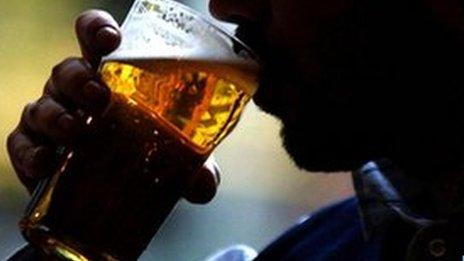What do those on Anglo-Scottish border think of drink-drive change?
- Published
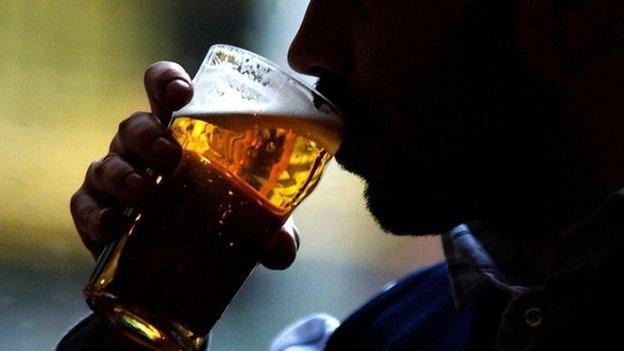
Scotland's new drink-drive limit has come into effect. The new limit of 50mg of alcohol in 100ml of blood will be lower than in the rest of the UK. What do people on the Anglo-Scottish border think of the new law?
If you go to the Gretna Chase Hotel this weekend and drink a pint before getting behind the wheel, you may want to be careful when leaving the car park.
By turning left, you will continue your journey into England and, after a solitary beer, you will probably still be under the legal drink-drive limit.
But if you turn right and drive for 20 yards over the Sark Bridge, you will have entered Scotland - and you may have just broken the law.
Earlier this week, I travelled between Scotland and England to discover what people thought about the new drink-drive limit north of the border.
There was widespread support for the new limit in Scotland but one point was raised time and time again - why isn't the new drink-drive limit being introduced in England as well?

Drink-driving laws - the differences
The current UK limit is 80mg per 100ml of blood. Europe's highest. Only Malta shares the same limit
Northern Ireland is considering making the same reduction as Scotland - to 50mg of alcohol per 100ml of blood
A 50mg limit would mean an average man would be limited to just under a pint of beer or a large glass of wine and women to half a pint of beer or a small glass of wine.
The Czech Republic, Romania, Hungary and Slovakia have introduced a zero-tolerance policy
Germany has a 50mg limit - but for new drivers, the limit is 0.
Source: European Transport Safety Council

The simple answer is the Scottish government, with its devolved powers, can change the law on its own and do not need to wait for Westminster politicians to agree.
In October, the then Justice Secretary Kenny MacAskill said the Scottish government did seek a joint approach with Westminster but the UK government decided to retain the current limit.
UK Road Safety Minister Robert Goodwill also confirmed there were no plans to alter the drink-drive limit in England.
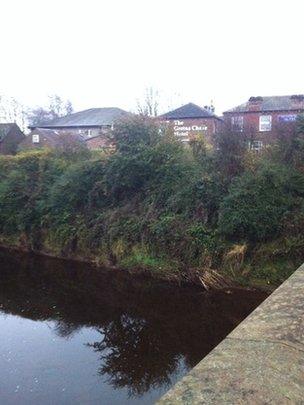
The Gretna Chase Hotel is only separated from Scotland by the River Sark
For those on the border, the difference in policy between Holyrood and Westminster has raised a few concerns.
"The legislation is fine when you are in the centre of Scotland," says James Monaghan, the licensee of the Gretna Chase Hotel, who would like the lower limit in England as well.
"When you are on the border here, it is a bit confusing for people. I think it is something that the two governments should have got together and kept both limits the same.
"I think it is not right, that you can have more drink on one side of the border and less on the other side."
The Gretna Chase Hotel is on the English side of the River Sark, the natural border between the two countries. Signs welcoming drivers to both Scotland and England are a stone's throw from the hotel gate.
Mr Monaghan says he is used to differences in Scots and English law affecting his business.
The ban on smoking in public places came into effect in Scotland a year before England, resulting in drivers from places such as Galashiels and Stranraer travelling to the hotel to enjoy a cigarette.

Why not impose an outright ban on drink-driving?
Road safety campaign group Brake have said that 20mg is as close to an absolute ban as you can get without accidentally penalising those with trace element of alcohol in their bloodstream.

Michelle Evans, 27, and 30-year-old Cassie Stewart are in the Gretna Chase enjoying lunch in the hotel, having stopped off on a drive from Glasgow to County Durham.
Both women welcomed the new lower limit and wanted it introduced in England too, where the current limit is 80mg of alcohol in 100ml of blood.
Cassie adds: "The new law shouldn't make any difference. I think you should already be sensible enough not to drink and drive, or not to drive the day after. Alcohol affects people in different ways."
A few miles down the road from the hotel is Longtown, a small English community dominated by a nearby Ministry of Defence base.
In this sleepy part of Cumbria, people seem to be well aware of the changes in Scotland.
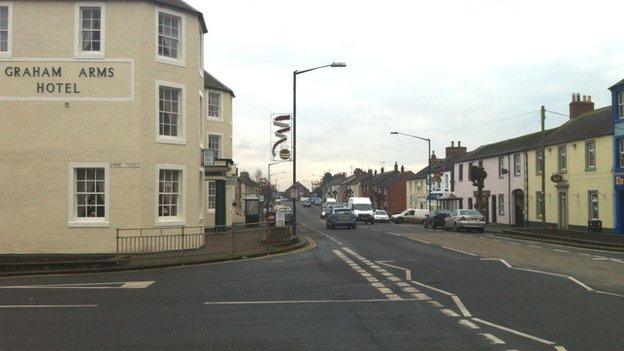
Longtown, located a few miles from the Scottish border
One of the biggest pubs in the village is the Graham Arms. One of its owners, Paul Brown, believes TV adverts from the Scottish government have helped to make the drink-drive limit the talk of his bar.
Like his fellow publican in Gretna, Paul wants the law to be the same on either side of the border.
"Things shouldn't be different because you cross the river," he says. "I totally respect the fact that Holyrood make their own decisions for the Scottish people.
"It is joined up thinking - if one country is going to do it, everybody should do it, including Wales and Northern Ireland."
Next door to the Graham Arms is the Lunch Box shop. Inside, Yvonne Moore stopped serving for a few minutes to ponder the change.
With a background in the ambulance service, she likes the legislation.
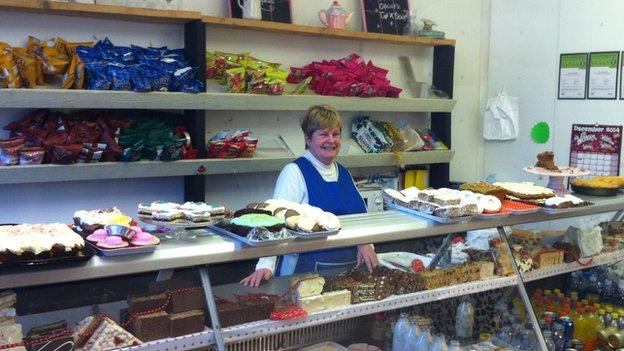
Yvonne Moore thinks England will eventually reduce the drink-drive limit as well
"England will probably follow eventually," she reflects. "It is a shame that you can't go out and have the one glass of wine, but not everyone has the one glass of wine."
Back in Scotland, the people of Dumfries also consider the new limit. Enjoying a walk in the town - which is about 23 miles from England - are Raymond and Eleanor Ingram, a husband and wife in their 70s.
Both are delighted with the new law, as Eleanor's life has been affected by the implications of drink-driving.
Almost 40 years ago, she was the passenger on the back of a motorbike in South Lanarkshire. A car driven by a drunken man pulled out on to the road in front of the bike.
As a result of the collision, she suffered a number of broken bones in her legs, her arms and her shoulders. She required 12 months of hospital treatment and her ex-husband, who was driving the bike, was also seriously injured.
While he eventually recovered from his injuries physically, the mental scars left their toll. The driver of the car, who was unhurt, was fined £35 and banned from driving for 18 months.
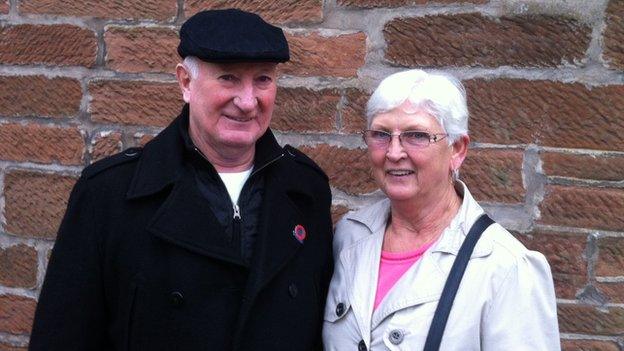
Raymond and Eleanor Ingram welcome the new law
"It totally shattered my life," says Eleanor. "It took about a year out of my life that I will never forget, or forgive. I have no sympathy for any drink-drivers. I am lucky to be here today."
A few streets away Maureen McKerrow, the former president of the Scottish Licensed Trade Association and licensee of the The Globe Inn in Dumfries, and Jacqueline Dickson - the licensee of Slipstream and president of the South West Scotland Licensed Trade Association - enjoy a coffee in Jacqueline's pub.
Both women welcome the law change but are frustrated at the lack of information given to the public so far.
Maureen adds: "The only information that might be presented locally is a big sign on the motorway coming into Scotland.
"I think it is very sad that all of our politicians couldn't have got their heads together and made one law for all - and not just Scotland."
Jacqueline says: "I think the government has forgotten, rushing through this new law, about the education of our young people about our new drink-driving limit.
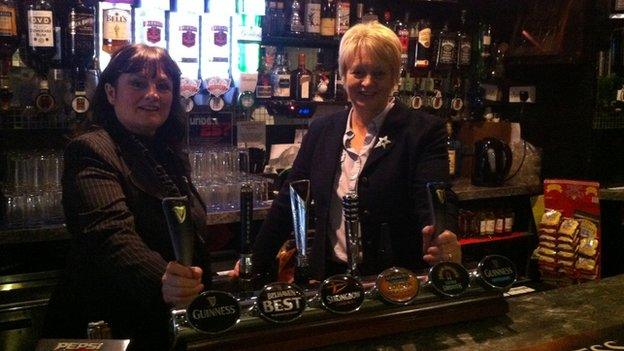
Jacqueline Dickson (left) and Maureen McKerrow want more advertising of the changes to the drink-drive limit
"In my view there will be motorists who face conviction through ignorance rather than intention."
The women call on supermarkets to do more to highlight the law change and suggest the police could offer breath tests on the street to show drinkers their alcohol limits.
The Scottish government's campaign on the new limit includes adverts, social media, events at supermarkets and working with petrol stations around the border.
Director of Road Safety Scotland Michael McDonald, along with the group Scotland's Campaign Against Irresponsible Drivers, welcomes the new limit.
Mr McDonald says: "The drink-drive limit at its current level is costing us the lives of an average of 20 people a year in Scotland, and therefore we need to do something about it.
"We are doing a bit of work in and around the border to make sure people who come across know things are different.
"We know that this move has very many supporters south of the border as well. People who live in the borders are often very conscious of the differences."
The new drink-drive limit in Scotland will be the latest of those differences.
For those on either side of the border, there is support for the legislation - but frustration of a different limit in England for the foreseeable future.
- Published24 October 2014
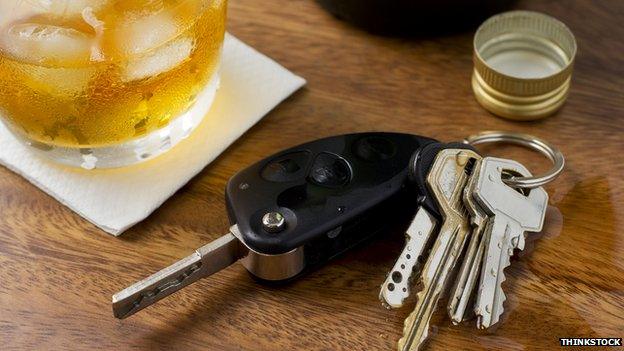
- Published24 October 2014
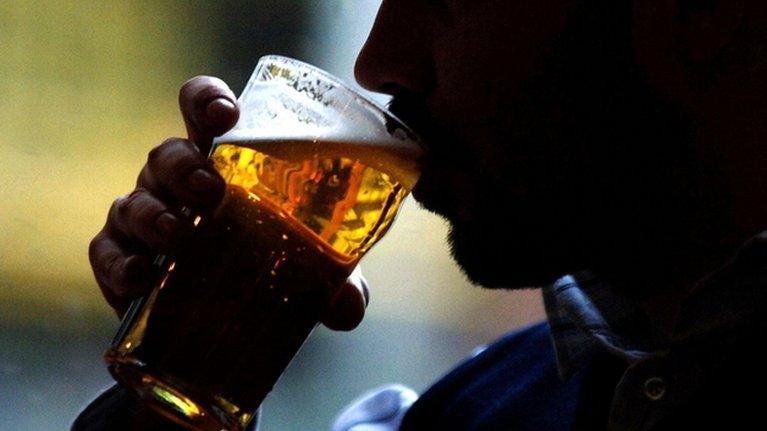
- Published17 November 2014
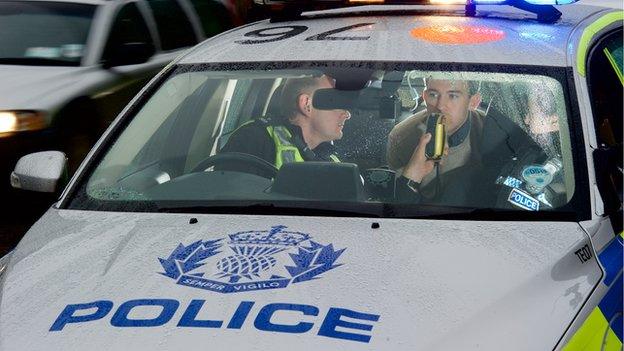
- Published21 March 2013
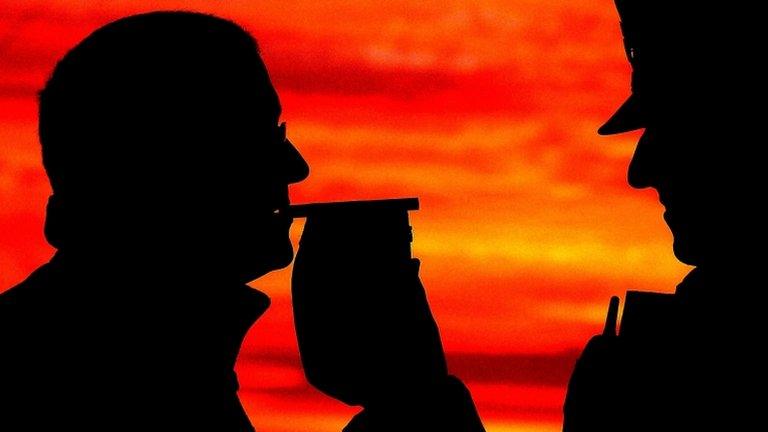
- Published27 May 2012
